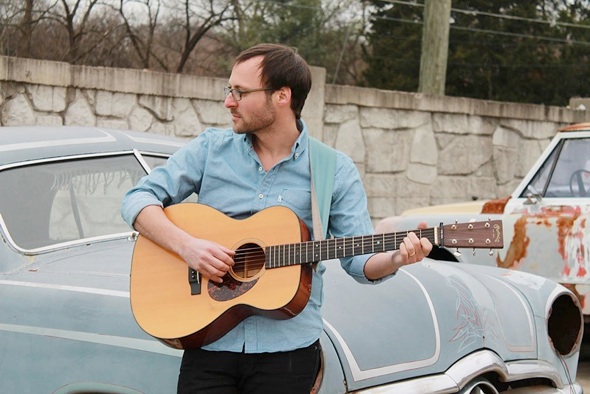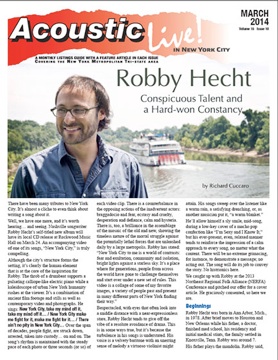There have been many tributes to New York City. It’s almost a cliche to even think about writing a song about it.
Well, we have one more, and it’s worth hearing… and seeing. Nashville songwriter Robby Hecht’s self-titled new album will have its local CD release at Rockwood Music Hall on March 24. An accompanying video of one of its songs, “New York City,” is truly compelling.
Although the city’s structure forms the setting, it’s clearly the human element that is at the core of the inspiration for Robby. The throb of a drumbeat supports a pulsating calliope-like electric piano while a kaleidoscope of urban New York humanity rushes at the viewer. It’s a combination of ancient film footage and stills as well as contemporary video and photographs. He sings: New York City, take my mind off it, take my mind off it… / New York City make me fight for it, make me fight for it… / There ain’t no pity in New York City… Over the span of decades, people fight, are struck down, arrested, taken into custody… on and on. The song’s rhythm is maintained with the steady pace of each photo or three seconds (or so) of each video clip. There is a counterbalance in the opposing actions of the inadvertent actors: braggadocio and fear, ecstasy and cruelty, desperation and defiance, calm and hysteria. There is, too, a brilliance in the assemblage of the mosaic of the old and new, showing the timeless nature of the mortal struggle against the potentially lethal forces that are unleashed daily by a large metropolis. Robby has stated: “New York City to me is a world of contrasts: fear and exultation, community and isolation, bright lights against a starless sky. It’s a place where for generations, people from across the world have gone to challenge themselves and start over under a new set of rules. This video is a collage of some of my favorite images, a variety of people past and present in many different parts of New York finding their way.”
Bespectacled, with eyes that often look into a middle distance with a near-expressionless stare, Robby Hecht tends to give off the vibe of a resolute avoidance of drama. This is in some ways true, but it’s because the turbulence in his songs is understated. His voice is a velvety baritone with an unerring sense of melody a virtuoso violinist might attain. His songs sweep over the listener like a warm rain, a satisfying drenching, or, as another musician put it, “a warm blanket.”
He’ll allow himself a sly smile, mid-song, during a low-key cover of a macho pop confection like “I’m Sexy and I Know It,” but his ever-present, even, relaxed manner tends to reinforce the impression of a calm approach to every song, no matter what the content. There will be no extreme grimacing, for instance, to demonstrate a message; no acting out. The song will do its job to convey the story. No histrionics here.
We caught up with Robby at the 2013 Northeast Regional Folk Alliance (NERFA) Conference and pitched our offer for a cover article. He graciously consented, so here we are.
Beginnings
Robby Hecht was born in Ann Arbor, Mich., in 1978. After brief moves to Houston and New Orleans while his father, a doctor, finished med school, his residency and initial medical stints, the family settled in Knoxville, Tenn. Robby was around 7.
His father plays the mandolin. Robby said, “I grew up singing the songs he would learn on his instrument.” Their musical tastes also influenced him. “My parents listened to a lot of classic folk and singer/songwriter music — Jim Croce, John Denver, Paul Simon, Peter Paul and Mary, Judy Collins, Crystal Gayle … these were all major influences early in my development as a songwriter.”
His own tastes went through phases common to many. There was rock, of course. In grade school there was classic rock: hair bands like Motley Crue, Def Leppard and Poison. In high school he was into Counting Crows, Lemonheads, The Grateful Dead, Tom Petty, The Band, Sarah McLachlan and The Indigo Girls.
Robby didn’t write or play popular music until he went to college. He did sing, however. He was in chorus from grades eight through 11, then joined the chamber singers group when he was a high school senior. Although he took guitar lessons when he was 10 and 14, he never stuck with it for very long.
Higher Education Plus Travel
During his time at the University of Wisconsin in Madison as an English and history major, Robby began gravitating toward a musical career.
His focus as a listener was on FM radio staples such as Tom Waits, Bob Dylan, Marc Cohn, Toad the Wet Sprocket, Joni Mitchell, Ben Harper, Coldplay and David Gray. The Internet was a handy tool to find tablature and learn favorite songs. He started playing in the stairwell of his dorm for the acoustics. “I made both friends and enemies that way,” he said.
During his freshman year, he started performing at open mics and at age 18 he made a “strangely confident and final” decision to commit to music as his calling and career.
After graduating, he took a few months off to travel in Europe with a friend. They stayed in a town about 40 minutes by train outside Paris. Robby would travel into Paris and busk outside the Hotel deVille numerous times. “It wasn’t the best place for an American busker,” he said. “The U.S. tourists walking by were looking for someone playing an accordion.” He played a couple of times in the garden at the Louvre. He’d also sit alongside the Seine and play — not performing so much, but nevertheless getting noticed by passersby.
AllDay Radio
A short time afterward, Robby moved to San Francisco. There, he met multi-instrumentalist Jason Jurzak at an open mic. They partnered, with Robby on lead vocals, and played local coffeehouses. They’d hire backup musicians once in a while, but they were essentially a duo. After ruminating for a while about a name, they picked “AllDay Radio.” They decided to move to more music-friendly Nashville, but were not received warmly by music publishers, who believed that if the style wasn’t country (they were decidedly folk/pop), it must be left-of-center. AllDay Radio made an album anyway and, slyly referencing an imaginary TV show, called it The Best of Season One. They printed a limited number of copies and sold them in DVD cases. The album, laden with acoustic guitar, fiddle and dobro licks and hummable melodies, is still available on iTunes and is well worth a purchase (I’ve got mine).
Jason didn’t stay in Nashville long — less than a year — before relocating to New Orleans. AllDay Radio ended amicably. Robby said that since Jason plays tuba, he found a great home in the “Big Easy.” He gets a lot of work with a number of bands and has been nominated as best sousaphone player in New Orleans.
Kismet and the Existential Dilemma
Robby had reconnected with Annie Klaver, a coed friend from Wisconsin, during his travels in Europe. They were both part of the small group who shared the accommodations outside Paris. Annie, who had been working in Rotterdam for the past three years, was relocating to the U.S. and given a choice by her employer of two locations: Irvine, Calif., or Nashville. Eerily, on the day after Jason and Robby decided to move to Nashville, she emailed him, and knowing that Robby was from Tennessee, asked him what Nashville was like. Robby replied, “We just decided yesterday to move there. We should live together.” So, she picked Nashville. When Jason moved out, Robby and Annie went from being roommates to being a couple. She’s his wife today.

A Time of Recognition
During this period, Robby was touring as he worked his way through treating his condition. He also began testing his abilities in the largest competitive songwriter festivals in America: the Telluride Troubadour Contest (Telluride, Colo.), the Wildflower Songwriting Contest (Richardson, Texas) and the Kerrville New Folk Competition (Kerrville, Texas).
He went to Telluride in 2006. “I was playing at it, but it felt real. I was there, competing in something I loved to do, and hoped that I was good at it.” He won second place and said, “It was a real confidence booster.” It also introduced him to a whole national community of singer/songwriters many of whom have become good friends (including the brilliant Nels Andrews, that year’s winner). Robby waited four years, then returned in 2010, this time taking first place.
Robby had applied three times to the Kerrville festival and failed to make the cut for the songwriter competition. He competed at Wildflower in 2007 and took first place. Another attendee suggested that he go to Kerrville without any ties to the competition. So that year, he went to Kerrville simply as an attendee, without any status as a competitor. He was just another folkie, sitting around the campfires and swapping songs. This gave him the feel of the festival and allowed him to relax when he returned in 2008 as a competitor and took first place.

The Albums
Robby released his first solo CD, Late Last Night, in 2008, the year he won at Kerrville. It’s concrete proof that he’d found his voice and was hitting his stride. Some of the lyrics buoyed by exquisite melodies appear to reflect Robby’s struggles with the darker side of his personality. On the first track, “Something, Somehow,” we hear: can you hear me scream can you hear me crawl / can you hear me knocking holes in the wall / yeah, I just can’t take it but I got my hands on something, somehow / oh, and baby, I’m going under now.
The title track points to a sense of inertia at the end of a relationship: days will come / when I’ll miss you some / and I’ll pray to God / to have you back home / but I will not move / I’ll just watch you fly away.
Last of the Long Days was released in 2011. I reviewed several songs from the album in our December 2013 NERFA wrap-up issue. About “Real Someday,” I wrote that it explores some of life’s existential questions: Hey old friend, would you come back home / I’m still here and I’m all alone / I know that you would find your way / Come back now it’s all OK / and I swear we’ll make it real someday. It has a repetitive refrain toward the end, I’m gonna be somebody, which repeats about eight times. Robby’s sound and his varying modulation make it thoroughly enjoyable. I also drew attention to his cover of Townes Van Zant’s “If I Needed You,” a duet with Jill Andrews, formerly of The Everybodyfields, calling it “exquisitely done.” A link to a live performance of this song, with Liz Longley providing harmony, is among the many video links on Robby’s website. The cache of videos is a treasure-trove.
A video he made of “The Hard Way,” also from this album, is comprised of amateur video clips of people dancing to the song’s bubbling, perky melody, reveling in their own movement. This is in contrast to the sad lyrics of the song which contains the album title: I will leave you alone, babe / It’s the last of the long days / And I’ll think of you this way / When I’m gone. It begins as we watch a grainy clip of a woman winning a large sum of money on a TV game show. As she reacts by deliriously running around the set, the song kicks in. The rest of the video is a celebration of dancers’ ecstatic physical reaction to other music, but in total sync with the beat of “The Hard Way.” It’s mesmerizing and I watched it again and again, transfixed.
The new CD, Robby Hecht, maintains the already high quality of his collected work. Along with the aforementioned “New York City,” other songs worth mentioning include “Soon I Was Sleeping.” With its pedal steel guitar backup, it has a strong country flavor and covers the familiar ground of an alcoholic’s failing marriage. He sings: …I called her up tipsy / she said she doesn’t miss me / I was thinkin’ I’d rather be dead / I put that bottle of whiskey / right where she used to kiss me / and soon I was sleeping instead. Rose Cousins, duetting beautifully, sings the part of the protagonist’s wife. Chris Parton of CMTEdge.com called her vocal “wounded but resolute.” Parton also took note of another song on the album called “The Sea and the Shore,” that Robby co-wrote with Amy Speace, as being similar thematically to “Soon I Was Sleeping.” In the song, the sea symbolically stands in for an errant male who returns to the shore, his mate, with a new song of redemption: here I am, with all that I have learned / I can hold you now with arms of foam and spray … Oh, please don’t say you’ll leave me here alone … The shore responds: …you left me here so long / I was promised to the moon while you were gone … You said all these things before / and I tell you I can’t hear them anymore… Robby told Parton, “The songs are very different in their imagery and characters, but both deal with the way inconsistency can ruin a relationship. This theme of inconsistency is what I identify with most closely on the record, and that definitely comes from living with bipolar and trying for so many years to figure out why it felt like I was two different people at the same time.”
On another track, “Papa’s Down the Road Dead,” things lighten up a bit. It’s a tongue-in-cheek, honky-tonk rockabilly treat that bounces happily along despite the title and subject matter: Mama come runnin’ through the screen door / throwed herself down on the floor / Papa’s down the road dead / Sister, she began to sob / brother knew he’d have to find a job… “When I’m With You Now” is a homage to a hard-won peace he’s forged with his wife, Annie. When I’m with you now, it’s like flyin’ away…
We’re looking forward to the release party at Rockwood Music Hall on March 24. We know that Robby Hecht live will be a thrill, as sure and steady as his recordings.
Upcoming Performances include:
Mar 1 7:30pm Prescott Center for the Arts, Prescott, Ariz.
2 7pm Higley Center for the Performing Arts, Gilbert, Ariz.
5 7pm Coconino Center for the Arts, Flagstaff, Ariz.
6 7:30pm Old Town Center for the Arts, Cottonwood, Ariz.
7 7:30pm Pinos Altos Opera House, Pinos Altos, N.M.
8 7:30pm Music in Corrales, Corrales, N.M.
12 4:50-5:10pm Gueros - South By Soup Fest Benefit, Austin, Texas
15 12:30-1pm Threadgill’s World Headquarters (Outdoor Stage)
Folk Alliance Party at SXS, W. Austin, Texas
20 7:30pm Ebenezers Coffeehouse, Wash. D.C.
24 8pm Rockwood Music Hall, Stage 3, New York, N.Y.
26 8pm Club Passim, Cambridge, Mass.
28 8pm Burlap and Bean, Newtown Square, Pa.
Website: robbyhecht.com


